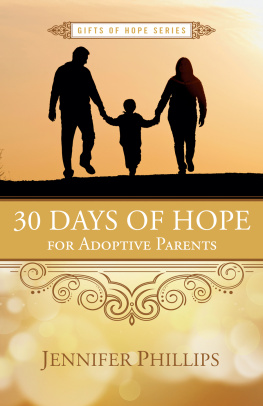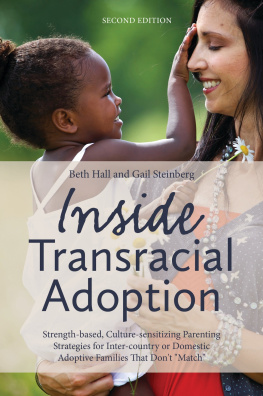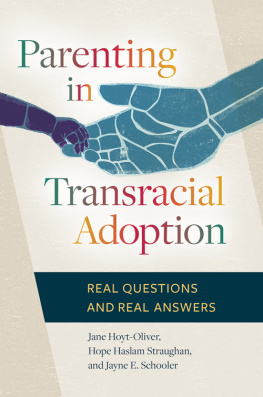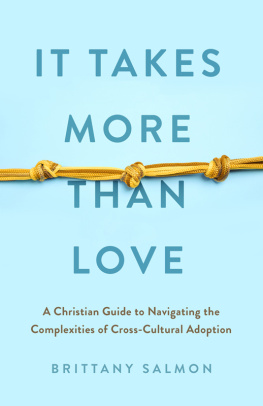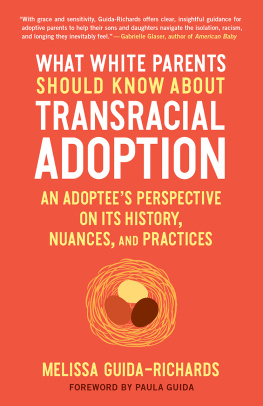IN THEIR VOICES
In Their Voices
BLACK AMERICANS ON TRANSRACIAL ADOPTION
Rhonda M. Roorda

Columbia University Press
New York
Columbia University Press
Publishers Since 1893
New York Chichester, West Sussex
cup.columbia.edu
Copyright 2015 Columbia University Press
All rights reserved
adapted with permission from Javier et al., Handbook of adoption: Implications for researchers, practitioners, and families (Thousand Oaks, CA: Sage Publishing, 2007).
Library of Congress Cataloging-in-Publication Data
Roorda, Rhonda M., 1969
In their voices : Black Americans on transracial adoption / Rhonda M. Roorda.
pages cm
Includes bibliographical references.
ISBN 978-0-231-17220-2 (cloth : alk. paper) ISBN 978-0-231-17221-9 (pbk. : alk. paper) ISBN 978-0-231-54048-3 (e-book)
1. Interracial adoptionUnited States. 2. AdopteesFamily relationshipsUnited States. 3. African AmericansRace identity. I. Title.
HV875.64.R66 2015
362.734089'00973DC23
2015011197
A Columbia University Press E-book.
CUP would be pleased to hear about your reading experience with this e-book at .
COVER PHOTO: Getty Images / Image Source
COVER DESIGN: Milenda Nan Ok Lee
References to websites (URLs) were accurate at the time of writing. Neither the author nor Columbia University Press is responsible for URLs that may have expired or changed since the manuscript was prepared.
This book is dedicated to the loving memory of Rita J. Simon, whose extensive scholarship and tireless advocacy in support of transracial adoption added voice to the many adoptees and families embarking on this journey. The partnership that I enjoyed with Rita for nearly twenty years produced the Simon-Roorda trilogy of books on transracial adoption and stretched my thinking on this fascinating and complex subject. I dearly treasured our friendship, her openness, and her generosity of time and spirit.
Thank you, Rita. Your work will not be forgotten.
Contents
by Leon W. Chestang
.
IN THE LATE 1960S and the early 1970s black people from all across the country, spurred by the death of Martin Luther King Jr., became acutely aware of, and sensitive to, the disparities they faced in American society. Before his death King had eloquently raised the issues of the injustices faced by black Americans. Kings was among the most notable, but his voice was joined by others, such as those of Malcolm X, Stokely Carmichael, and Lerone Bennett, to name only a few of the most prominent leaders of the civil rights movement of the time. African Americans of almost every stripepeople on the streets, clergy, people in the halls of the academy, and professional people in almost every disciplinetook to their pens, raised their voices, published books and essays, spoke from soap boxes on street corners, and shouted from their pulpits, declaring that injustice in American society must end. Their demands echoed the words of the Supreme Court almost a decade earlier when it urged that the end of injustice must proceed with all deliberate speed.
In this context many black professional social workers began to question an emerging effort in their field to address the disproportionate and overwhelming numbers of black children who were languishing in foster care. That new effort was placing black children in white families for adoption. But other considerations influenced the nature of the discussion. The practice we now call transracial adoption had its earliest beginnings at a time when African Americans were developing anew their sense of personal identity, self-esteem, self-concept, and personal pride in their relationship with their native land of Africa. To be sure, these social workers were deeply concerned about the welfare of children in foster care, but they were also concerned about the effect of transracial placements on these childrens emerging sense of self.
What had begun as a discussion with the potential to be an examination of a new trend in adoption practice was transformed in short order to a debate about the rightness of this new effort, the motivations of those who welcomed these children into their homes, and the potential, if not the certain, deleterious effects of sending black children to live with white families. These were not small matters. Those on both sides of the debate felt strongly about their positions.
Proponents of the practice of placing black children in white homes considered it reasonable, humane, and even progressive. For the proponents the questions were, Is it better to leave these children in the limbo and doubtfulness of an underfunded and understaffed foster care system with no promise of finding a permanent home for them before they reached their majority? Or should they be given the opportunity for a more promising future, even with a white family? Is it not immoral to deny white parents who clearly desired a child the opportunity to provide these children with a safe haven and the protection of a loving family during their tender childhood years? Or should these children be required to remain in foster care until more abundant black adoptive families could be recruited?
Opponents of transracial adoption raised significant questions challenging a practice that they believed threatened the development of wholesome identities, eroded competent senses of self-esteem, and jeopardized the emergence of robust self-concepts. The more strident among the opponents of transracial adoption raised the specter of a conspiracy to commit genocide among black children. These were tumultuous times indeed. Both sides were convinced of the rightness of their position, and both sides argued largely without evidence. For more than a decade the debate continued with seething hotness. The embers continue to smolder even now.
Even as I write this, emotions that I thought had quieted long ago arise in me anew, threatening to overtake my scholarly objectivity and revive my thoughts and feelings of that period. I almost tremble when I recall my frustration at the letters I received from people in Minneapolis that criticized me, based on an article I had published, for what they believed to be my position against transracial adoption. I am equally frustrated by the criticisms I received from colleagues in the National Association of Black Social Workers for what they believed to be my position favoring transracial adoption. Both criticisms were wrong, of course, for in the article I took the middle ground, recognizing that both sides had raised important issues. In my thinking at the time deciding the wisdom of this approach to adoption would be left to the future. I did suggest that if this practice succeeded, it had the potential to benefit society as a whole. My early observations on this subject did not end the debate.
Now forty-five years later, we take up the subject of transracial adoption yet again. This time we are fortunate to have the wise leadership of Rhonda M. Roorda, herself a transracially adopted child, to lead us through the complex and multifaceted territory of transracial adoption. Roorda and her colleague Rita J. Simon have examined almost every facet of this type of adoption in an earlier trilogy on the matter. Having talked to white parents who adopted black children, and to members of African American communities, this time she adds another dimension to her important subject. She not only speaks to transracially adopted children, she speaks with them, not as an intermediary but as a skilled facilitator who brings out the depth and the best of what these children have to say. And what they have to say is at once highly emotional and insightful. By turns their revelations are moving and critical. When they speak of the pain they suffered when the external world challenged their sense of self or their identity, one is compelled to think more seriously about any previous assumptions made about them. When they speak of the love they received in their adoptive families, a thoughtful person cannot help rethinking notions about the damage they had erroneously expected these children would suffer because of their adoptive experience. At the same time the adoptees reports of the lack of knowledge possessed by some white adoptive parents make clear the need for these parents to reach out to the black community and to find ways to facilitate the development of connections between transracially adopted children and their heritage.
Next page

